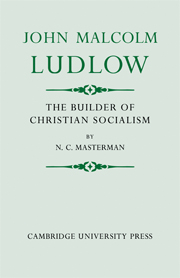Book contents
- Frontmatter
- Contents
- Acknowledgements
- INTRODUCTION
- I THE PARISIAN SCHOOLBOY
- II THE STRANGE YOUNG LAWYER
- III THE FRATERNAL CHRISTIAN
- IV FRENCH SOCIALISM FOR ENGLISH CHARTISTS
- V THE STATESMAN OF CO-OPERATION
- VI THE PRODUCER'S THEORETICIAN
- VII A PROPHET OUT-PROPHESIED?
- VIII REVIEWER AND EDUCATIONALIST
- IX THE DEMOCRATIC IMPERIALIST
- X THE MENTOR OF GERMANS
- XI LEGISLATOR AND CIVIL SERVANT
- XII THE CRITICAL UNIONIST
- Conclusion: LUDLOW'S ACHIEVEMENT
- Appendix: LUDLOW ON THE JUNTA
- Notes
- Bibliography
- Index
III - THE FRATERNAL CHRISTIAN
Published online by Cambridge University Press: 07 October 2011
- Frontmatter
- Contents
- Acknowledgements
- INTRODUCTION
- I THE PARISIAN SCHOOLBOY
- II THE STRANGE YOUNG LAWYER
- III THE FRATERNAL CHRISTIAN
- IV FRENCH SOCIALISM FOR ENGLISH CHARTISTS
- V THE STATESMAN OF CO-OPERATION
- VI THE PRODUCER'S THEORETICIAN
- VII A PROPHET OUT-PROPHESIED?
- VIII REVIEWER AND EDUCATIONALIST
- IX THE DEMOCRATIC IMPERIALIST
- X THE MENTOR OF GERMANS
- XI LEGISLATOR AND CIVIL SERVANT
- XII THE CRITICAL UNIONIST
- Conclusion: LUDLOW'S ACHIEVEMENT
- Appendix: LUDLOW ON THE JUNTA
- Notes
- Bibliography
- Index
Summary
It would be absurd to maintain that Christian Socialism could be adequately described in terms of Ludlow's life alone. It was Maurice who provided the theological and speculative framework within which Ludlow's essentially executive mind could act.
Maurice was the son of a Presbyterian minister who had become a Unitarian. As a result, his father, like his fellow Unitarians, Joseph Priestley and Richard Price (the former of whom he had helped to escape from Church-and-King mobs to America), had remained, in spite of Edmund Burke, a passionate supporter of the French Revolution, continuing to be pro-French even after the emergence of Napoleon.
Unitarians claimed, like other Protestant denominations, to have rediscovered the real nature of Christianity. Reacting against the Calvinist doctrine of the total depravity of man, they emphasised that in Christian teaching it was God who created the world and that he had found it good. Some of them considered that natural environment was governed by a beneficent law which man could discover; that man had a God-created body as well as a God-created soul; that his most valuable feelings were social rather than purely self-interested; and they were thus transitional figures between Liberalism and Socialism. Richard Price, for example, wrote on subjects like Free Trade, political constitutions, the actuarial science required for friendly societies, rather than on how the individual could avoid the pains of the world to come resulting from his sinful nature in this present one.
- Type
- Chapter
- Information
- John Malcolm LudlowThe Builder of Christian Socialism, pp. 51 - 73Publisher: Cambridge University PressPrint publication year: 1963



